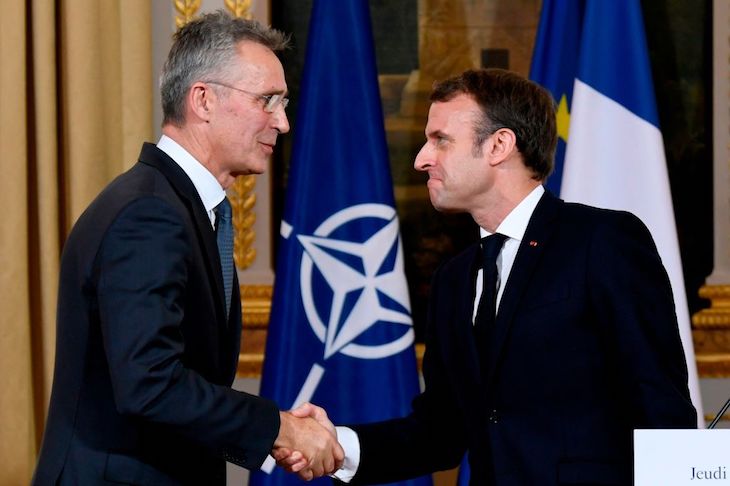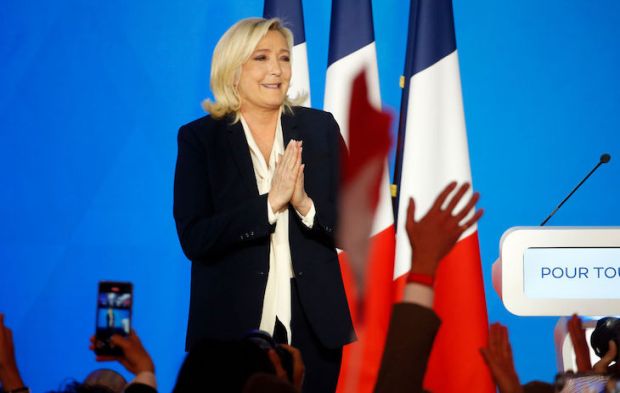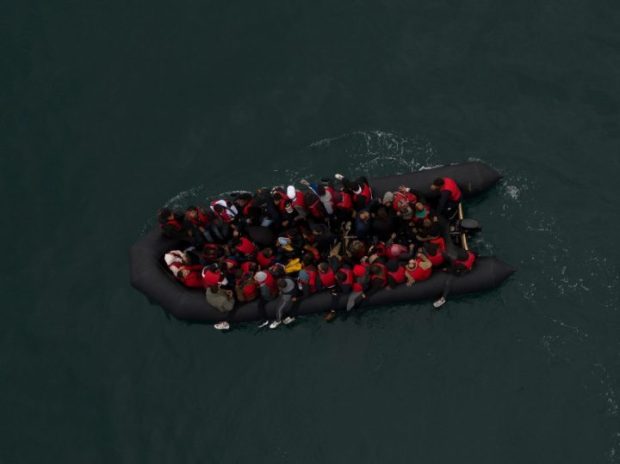This week is seminal for Boris Johnson and Emmanuel Macron. Boris, in Watford, is hosting one of the most important Nato summits for years. Its significance is not because it marks the Alliance’s 70th anniversary, but because of President Macron’s ‘disruptive’ and trenchant criticism of the Atlantic Alliance as close to ‘brain dead’, which has touched a nerve. The French President went on to reiterate his remarks at an Elysée press conference, with a visibly uncomfortable Nato Secretary General, three weeks later. Macron attacked the ‘strident and unacceptable disconnection’ from world threats during the last two Nato summits as being ‘uniquely devoted’, in his sarcastic words, ‘to finding solutions to how to lighten the United States’ financial costs’. All this, says Macron, while major strategic questions such as relations with Russia, Turkey and ‘who is the enemy?’ remain unanswered.
Expect fireworks at this summit, from Trump on the lack of ‘burden-sharing’ by Nato’s European partners, threats of a European army by Macron, anti-Macron taunts by Central and Eastern European states, all while fuel is added to the flames by Turkey’s President Erdogan, who provoked a Franco-Turkish diplomatic rift on Friday by claiming it was Macron who was ‘brain dead’ and insisting he would say so again at the summit. An enfeebled Merkel will have little clout at playing peacemaker, despite having publicly rebuked Macron for his remarks.
Enter Boris. Here is a golden opportunity to emblazon his tarnished international image (after his woefully perceived stint as Foreign Secretary) by applying balm and bonhomie to this potential bear-pit of 29 member states. Britain, 70 years previously, had been a key founding member of Nato, providing its first headquarters (before they were transferred to France, then to Belgium) and its first Secretary General. Could Britain again show statesmanship in Watford? A mere week before the elections, Boris could gild an un-statesmanly persona with some gravitas. But the summit could also go horribly wrong if Boris puts on a bad show. And CCHQ are terrified that the Donald might make some impromptu vote-sapping remark about the NHS that could delight Boris’s political opponents. Beware the Watford gaffe!
What Emmanuel Macron will be dreading is the day after the summit. Not for what transpires in Watford, but because 5th December is the beginning of France’s largest national strike since 1995. Hence Macron’s one-day presence at the vital two-day Nato summit. France’s major trades unions have signed up to the strike, initially called to protest against Macron’s proposed reform of France’ baroque and over-generous pension system. But the strike’s remit has widened to threaten other aspects of Macron’s reforming agenda. Several million workers from the public and private sectors are now expected to down tools, not to mention students, lawyers and the unbowed gilets jaunes. More worrying still, striking unions have announced this to be an ‘unlimited’ strike. The national train service SNCF has stopped selling tickets for journeys from 5-8 December. Perhaps worst of all for Macron, an opinion poll on 28 November showed 66% of the French supported the strike, which explains why the demonstration will be joined by numerous political parties outside Macron’s majority. All this is conjuring up memories of the massive autumn 1995 strike – on pensions reform – that lasted three weeks before President Jacques Chirac signalled to his Prime Minister Alain Juppé to back down.
This is not good for Macron. He may have recovered some popularity since the gilets jaunes but it has cost him dearly, literally: billions of euros in expenditure on salary increases and tax rebates, an embarrassing reprimand from Brussels for a budget deficit that the IMF puts at 3.4% of GDP, not to mention the defection of 10 MPs from his party. With important local elections in March – largely seen as a vote on the President – and Marine Le Pen, his right-wing nemesis, supporting the strike, Macron could be on the way down again.
Despite this opposition, Macron repeatedly commits to getting his reforms done – a mantra that conjures up Boris’s ‘get Brexit done’. Whether the exhortations of either leader meet with success will decide their respective futures. But the Watford week could be an important opportunity and test for both men.
Got something to add? Join the discussion and comment below.
Get 10 issues for just $10
Subscribe to The Spectator Australia today for the next 10 magazine issues, plus full online access, for just $10.




















Comments
Don't miss out
Join the conversation with other Spectator Australia readers. Subscribe to leave a comment.
SUBSCRIBEAlready a subscriber? Log in